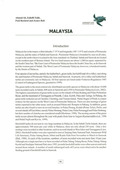Malaysia
| dc.contributor.author | Ali, Ahmad | |
| dc.contributor.author | Talib, Zulkifli | |
| dc.contributor.author | Basintal, Paul | |
| dc.contributor.author | Bali, James | |
| dc.contributor.editor | Talib, Zulkifli | |
| dc.contributor.editor | Ali, Ahmad | |
| dc.contributor.editor | Yaacob, Ku Kassim Ku | |
| dc.contributor.editor | Isa, Mahyam Mohd. | |
| dc.date.accessioned | 2019-11-07T12:25:47Z | |
| dc.date.available | 2019-11-07T12:25:47Z | |
| dc.date.issued | 2004 | |
| dc.identifier.citation | Ali, A., Talib, Z., Basintal, P., & Bali, J. (2004). Malaysia. In Z. Talib, A. Ali, K. K. K. Yaacob, & M. Mohd. Isa (Eds.), Conservation and Enhancement of Sea Turtles in the Southeast Asian Region (pp. 61-94). Kuala Terengganu, Malaysia: Marine Fishery Resources Development and Management Department, Southeast Asian Fisheries Development Center. | en |
| dc.identifier.isbn | 9839114166 | |
| dc.identifier.uri | http://hdl.handle.net/20.500.12561/1112 | |
| dc.description.abstract | Malaysia lies in the tropics within latitudes 1°-8°N and longitudes 100°-119°E and consists of Peninsular Malaysia, and the states of Sabah and Sarawak. Peninsular Malaysia is bounded by seas on all sides, except in the north where it is joined to the Asia mainland via Thailand. Sabah and Sarawak are located on the northern part of Borneo Island. The two land masses are about 1,200 km apart, separated by the South China Sea . The East Coast of Peninsular Malaysia faces the South China Sea , as do Sarawak and the western part of Sabah. The West Coast of Peninsular Malaysia, however, is bordered mainly by the Straits of Malacca. | en |
| dc.language.iso | en | en |
| dc.publisher | Marine Fishery Resources Development and Management Department, Southeast Asian Fisheries Development Center | en |
| dc.subject | Malaysia | en |
| dc.title | Malaysia | en |
| dc.type | Book chapter | en |
| dc.citation.bookTitle | Conservation and Enhancement of Sea Turtles in the Southeast Asian Region | en |
| dc.citation.spage | 61 | |
| dc.citation.epage | 94 | |
| dc.subject.asfa | Aquatic reptiles | en |
| dc.subject.asfa | Conservation | en |
| dc.subject.asfa | Legislation | en |
| dc.subject.asfa | Egg counters | en |
| dc.subject.asfa | Eggs | en |
| dc.subject.asfa | Licensing | en |
| dc.subject.asfa | International agreements | en |
| dc.subject.asfa | International cooperation | en |
| dc.subject.asfa | By catch | en |
| dc.subject.asfa | Hatcheries | en |
| dc.subject.asfa | Management | en |
| dc.subject.asfa | Incubation | en |
| dc.subject.asfa | Hatching | en |
| dc.subject.asfa | Tagging | en |
| dc.subject.asfa | Telemetry | en |
| dc.subject.asfa | Tracking | en |
| dc.subject.asfa | Ultrasonic devices | en |
| dc.subject.asfa | Ultrasonics | en |
| dc.subject.asfa | Protected areas | en |
| dc.subject.asfa | Feeding | en |
| dc.subject.asfa | Feeding migrations | en |
| dc.subject.asfa | Migrations | en |
| dc.subject.asfa | Fishery regulations | en |
| dc.subject.asfa | Research | en |
| dc.subject.asfa | Resource conservation | en |
| dc.subject.asfa | Natural resources | en |
| dc.subject.asfa | Protected resources | en |
| dc.subject.asfa | Rare resources | en |

